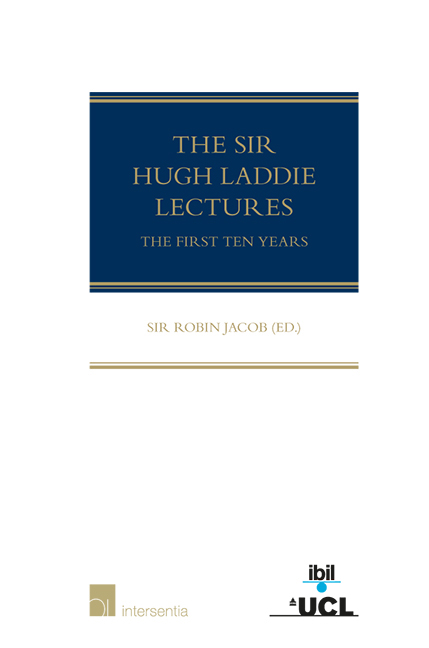Book contents
- Frontmatter
- Preface
- Contents
- List of Contributors
- The Insatiable Appetite for Intellectual Property Rights
- The Function of a Trade Mark: Hugh Laddie and the European Court of Justice
- From National Patent Litigation to a European Patent Court: A Dream, A Wish, or Soon, Reality?
- Killing the Goose that Laid the Golden Egg: Too Many Trade Marks? Use and Intention to Use in EU Trade Mark Law
- The Growing Imperative to Internationalise the Law
- Community Trade Marks: A Swiss Cheese?
- The Culture of the Public Domain: A Good Thing?
- IP and Advocacy
- Patents and Populism
- Towards a Global Copyright Law?
- Apologia Pro Vita Sua: A HiFi Retrospective and a Modest Prospective
- About the Editor
The Function of a Trade Mark: Hugh Laddie and the European Court of Justice
Published online by Cambridge University Press: 09 November 2019
- Frontmatter
- Preface
- Contents
- List of Contributors
- The Insatiable Appetite for Intellectual Property Rights
- The Function of a Trade Mark: Hugh Laddie and the European Court of Justice
- From National Patent Litigation to a European Patent Court: A Dream, A Wish, or Soon, Reality?
- Killing the Goose that Laid the Golden Egg: Too Many Trade Marks? Use and Intention to Use in EU Trade Mark Law
- The Growing Imperative to Internationalise the Law
- Community Trade Marks: A Swiss Cheese?
- The Culture of the Public Domain: A Good Thing?
- IP and Advocacy
- Patents and Populism
- Towards a Global Copyright Law?
- Apologia Pro Vita Sua: A HiFi Retrospective and a Modest Prospective
- About the Editor
Summary
WELCOME AND INTRODUCTORY REMARKS
Professor Dame Hazel Genn Good evening, ladies and gentlemen. I am Dean of the Faculty of Laws at UCL. It is a great pleasure to welcome you all to the Faculty's inaugural Sir Hugh Laddie Annual Lecture to be delivered this evening by Lord Hoffmann. I am going to hand over to our President and Provost, Professor Malcolm Grant, in a moment. He is going to preside over the proceedings, but I want to say a few brief words of introduction myself.
We have a fantastic audience here this evening. We have a wide variety of people with us – the judiciary, policymakers, people from private practice, in-house lawyers and academics. This is a fitting tribute to a most sorely missed colleague and a reflection of what a towering presence Hugh was in the field of intellectual property. Equally importantly, it is a reflection of what a wonderful person he was and the impact he made on those who knew him. The Faculty of Laws at UCL has established this annual series to commemorate Hugh's contribution to the Faculty and to the development of IP at UCL. In fact, this evening's lecture was arranged by Hugh. Hugh had had the idea of organising a series of annual lectures on intellectual property, and last year he booked this date and Lord Hoffmann to speak this evening. After the loss of Hugh, the Faculty wanted to ensure that Hugh's vision was realised, and, as a lasting memory to Hugh, we have named the series after him.
I am pleased to welcome you all this evening and give the Faculty's special thanks to the sponsors of IBIL for continuing to support its work, and to Ilanah Fhima Simon and Veronica Barresi for carrying on Hugh's work. I am delighted also that Lady Stecia Laddie and James Laddie are here this evening, and now I hand over to the Provost Professor Malcolm Grant, who will introduce the Chair and speaker.
Professor Malcolm Grant Thank you very much, Hazel. When Hugh resolved to step down from the Bench in 2005, it coincided with an initiative that we had at UCL to establish a new post in intellectual property.
- Type
- Chapter
- Information
- The Sir Hugh Laddie LecturesThe First Ten Years, pp. 19 - 36Publisher: IntersentiaPrint publication year: 2019



